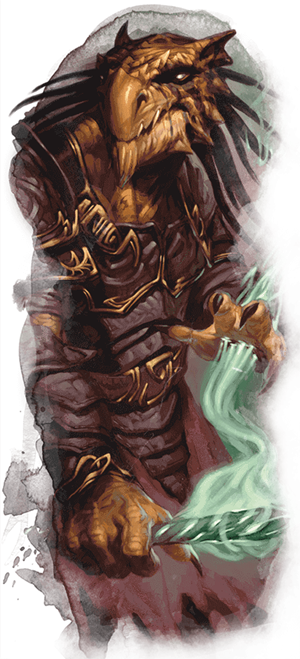 Class is in session, and though your sorcerer doesn’t need to study magic, it won’t hurt if you brushed up on your sorcerer-playing skills! A sorcerer learns their spells through inspiration and discovery, not through study or bargaining, like a wizard or a warlock might. This primal magic is reflected in your spell list, but it can also manifest in unusual ways—such as your draconic mutations!
Class is in session, and though your sorcerer doesn’t need to study magic, it won’t hurt if you brushed up on your sorcerer-playing skills! A sorcerer learns their spells through inspiration and discovery, not through study or bargaining, like a wizard or a warlock might. This primal magic is reflected in your spell list, but it can also manifest in unusual ways—such as your draconic mutations!
Story of the Draconic Bloodline
“My mother, my grandmother, my great-grandmother—I swear, I haven’t done this much reading in my entire life!” the sorcerer exclaimed. He collapsed back into his chair, sending scroll cases tumbling with the impact. The sorcerer was a human, barely an adult, and practically a child by the stands of the elven wizard that stood over him.
The wizard shook his head, his long, starlight-silver hair shimmering in glow of the sorcerer’s dancing lights. “Not in your entire life, eh? I believe you. Yet reading is a skill you would do well to cultivate, young pup, if you wish to develop true skill with the arcane arts. Starting with your genealogy is a good enough place as any, if it is a topic that interests you.”
The sorcerer shot the elf a dirty look. Only two weeks they had been traveling together, and already this elf was trying to teach him wizardry. He turned back to his scroll and sighed. I don’t need books, he thought to himself, as he skimmed down column after column of birth records. My magic… it comes naturally. If the wizard’s explanations were to be believed, it came from an ancient ancestor. The sorcerer scratched idly at the patch of scales upon the back of his hand. Golden scales—the sign of a union with a gold dragon somewhere in his bloodline.
The sorcerer’s eyes, half-closed with exhaustion and strain from the dim candlelight, suddenly shot wide open. My four-times-great-grandfather. Partner unknown. The sorcerer stood bolt-upright, knocking over his chair and, once more, scattering a half-dozen ancient scrolls. “Hey, old wizard!” he exclaimed.
The wizard swooped over, putting one hand on the boy’s shoulder, forcing him back into his seat, and one hand upon the table. He leaned into the text. “Yes, I see. No recorded partner, yet she bore several children in… the year 1263.” The wizard glanced at the gold scales on the back of the sorcerer’s hand, and thought for a moment. “Come, boy!” he said at last, practically twirling away from the table. “That date tells us everything! There is a copy of the Draconomicon within this library. We shall know the identity of your fire-breathing ancestor yet!”
Sorcerers are mages with power that comes from within. Most sorcerers possess no formal training, and simply act on instinct. While talking about this on Twitter earlier this week, Twitter user @deerlordhunter compared sorcerers to “human calculators” when juxtaposed with wizards, who learned to “[do] it all by hand on paper.” If you’re looking for some character traits while creating your sorcerer, consider thinking about the kids in school who never had to study because they were able to coast by on natural talent. The cliché is that these people are arrogant, but speaking from personal experience as one of these kids, I think a better trait to embody is fear—fear of losing your edge, of making one misstep and making people think you’re a fraud, and so on. Of course, both arrogance and fear can coexist. In fact, they often do.
These traits lend themselves well to strong, internal character arcs of self-discovery and personal growth. Seeing a character learn to let go of pride and fear by cultivating humility and empathy—like Prince Zuko from Avatar: the Last Airbender—can be incredibly powerful, both to you and your fellow players. Consider tailoring your spell selection to this character arc. Since you learn new spells when you gain levels (and can even trade in one old spell for a new spell once per level), you can show gradual character growth on a mechanical level, too.
All sorcerers also have the story of an ancient and mysterious power in their bloodline as the source of their magic. As a Draconic Bloodline sorcerer, you know that the innate magic of dragons flows within your veins, granting you your spells, as well as a bevy of draconic powers. Think about the implications of this when creating your character and thinking about what story you want to tell with them. Will they try to find their mysterious ancestor, like the sorcerer in the story above? Or maybe they already know who their ancestor is, because their ancient dragon grandmother raised them herself?
Draconic Bloodline Features
The Draconic Bloodline is the most iconic sorcerous origin, using the archetypal magical beast—the dragon—as the source of your innate power. The sorcerer gains four subclass features at 1st, 6th, 14th, and 18th level. You can read all of the Draconic Bloodline features for free in the D&D Basic Rules. In summary, your subclass features allow you to:
- Speak with dragons more convincingly than other humanoids.
- Gain natural armor through dragon scales, as well as improved hit points.
- Improve your damage with a specific damage type, and gain the ability to resist that damage type.
- Fly upon draconic wings.
- Awe or terrify lesser beings with your own draconic presence.
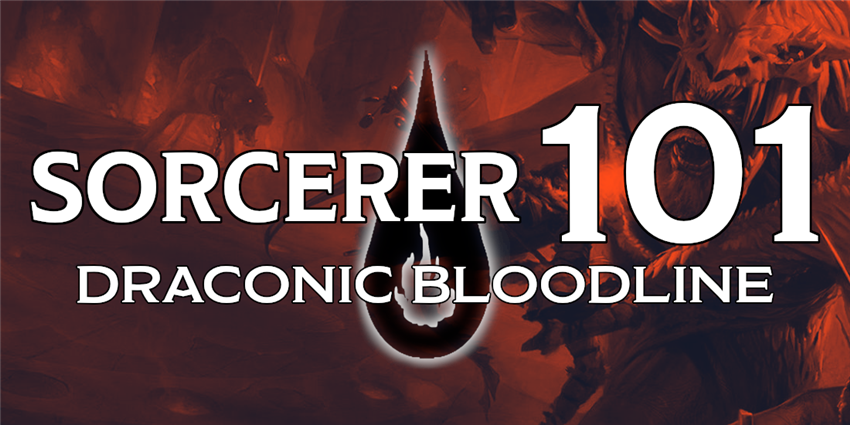
Benefits of the Draconic Bloodline
The Draconic Bloodline is a bit unique among the subclasses found in D&D’s Basic Rules, because despite being the most iconic sorcerer subclass, it tends to shore up the sorcerer class’s inherent weaknesses, rather than heightening its existing strengths. For example, you gain no armor proficiencies as a sorcerer. Normally, in order to improve your Armor Class, you would have to cast mage armor. And in order to do that, you would need to not only spend a precious spell slot, but also use one of your even more precious Spells Known to learn mage armor in the first place. However, the first feature of the Draconic Bloodline sorcerous origin grants you the effects of mage armor permanently by increasing your AC to 13 + your Dexterity modifier. This same feature also increases your middling hit points every time you level up.
This pattern of improvements generally persists as you level up, shoring up your weak points and occasionally doubling down upon your strengths. The Dragon Wings feature also saves you from having to learn and cast fly, though the feature can only affect you and not others. Elemental Affinity encourages specialization in a certain element—the element associated with your draconic ancestor—by improving your damage when casting spells of that elemental damage type.
By taking a highly middle-of-the-road approach, the Draconic Bloodline allows you to be a versatile and highly multi-classable sorcerer. Try multiclassing into paladin if you want to add some steel to your sorcerer. Or, try multiclassing into warlock for a more eldritch feeling—like you couldn’t skate by on your innate talent alone, so you turned to an unwholesome patron for help.
Drawbacks of the Draconic Bloodline
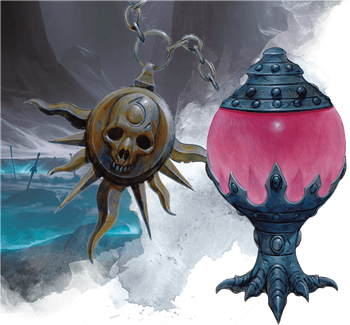 The Draconic Bloodline’s greatest strength is also its greatest weakness. Since it balances out some of your flaws, it never is able to help your strongest features reach their full potential. What’s more, the drawbacks that it attempts to balance out aren’t even the worst of the sorcerer’s woes. Far and away, the hardest part of playing a sorcerer is how few spells you have access to. Even though your spell list is comparable in size to most other spellcasting classes (other than the wizard, of course), the number of spells you actually know is woefully inadequate.
The Draconic Bloodline’s greatest strength is also its greatest weakness. Since it balances out some of your flaws, it never is able to help your strongest features reach their full potential. What’s more, the drawbacks that it attempts to balance out aren’t even the worst of the sorcerer’s woes. Far and away, the hardest part of playing a sorcerer is how few spells you have access to. Even though your spell list is comparable in size to most other spellcasting classes (other than the wizard, of course), the number of spells you actually know is woefully inadequate.
This is a drawback of the sorcerer class as a whole, and it’s actually something of a compliment to the Draconic Bloodline that the hardest part of playing it is intrinsic to the class itself. On the other hand, more recent sorcerer subclasses from Xanathar’s Guide to Everything do at least a little to shore up the sorcerer’s limited spell selection. Sorcerous Origins like Divine Soul and Shadow Magic give you one extra spell that’s thematic to the subclass. I suspect, if the Draconic Bloodline were printed in Xanathar’s Guide to Everything, it would add the dragon’s breath spell to its Spells Known list for free, starting at 6th level—perhaps with the stipulation that it can only be cast in this way using the element you chose at 1st level.
If you’re a Dungeon Master and you see your Draconic Bloodline sorcerer struggling to have fun, consider using the above houserule! I don’t think it’s necessary—the sorcerer class’s inherent limitations breeds creativity in people who are interested in being creative—but it’s up to you to help make your game fun for everyone.
Suggested Build
As a sorcerer, you get to choose your Sorcerous Origin at 1st level! While this means that you get to reap the benefits of your subclass from the very beginning, it also means that you don’t have any time to “settle in” to your role and figure out how you want to play your character before making this big decision. Consider your subclass carefully!
You should choose a race that improves your Charisma score and either your Dexterity or Constitution scores. As a sorcerer, Charisma is your most important ability. Your spells are powered by your own confidence, force of personality, and determination—as if you were a shounen anime hero!—which is represented by your Charisma. Even though you’re a spellcaster, the Draconic Bloodline encourages playing recklessly, so improving your Dexterity (for a better Armor Class) or your Constitution (for more hit points) is a great choice! Constitution does double duty by making it easier to hang onto spells that require concentration, and since you might take a hit now and again, being able to maintain concentration is a pretty big deal.
Tieflings make excellent sorcerers, since they boost your Charisma and also give you a few extra spells that you can cast as a racial ability rather than learning through your class. Half-elves are also great, since they come with a big Charisma boost and let you boost two other ability scores of your choice. Lightfoot halflings are both dexterous and charismatic, and their other racial traits will serve you well. If you don’t mind hating the sun, playing as a drow is an attractive proposition, since they also give you a boost to both Charisma and Dexterity, as well as a few extra spells. And, as always, the variant human race is never a bad pick.
Choose EQUIPMENT instead of GOLD at the end of character creation. Since you’ll probably be choosing at least one ranged damage-dealing cantrip, you can safely forgo choosing a light crossbow in favor of a simple weapon, like a quarterstaff or a dagger. Whether you choose an arcane focus or a component pouch is purely a flavor choice (do you like using a wand or a magical crystal to focus your arcane power into spells, or do you want to use eye of newt and toe of frog to make magic happen?). If you think you’ll be in dungeons a lot, take a dungeoneer’s pack. Otherwise, go explorer. Finally, you get two extra daggers. Nice!
Spells
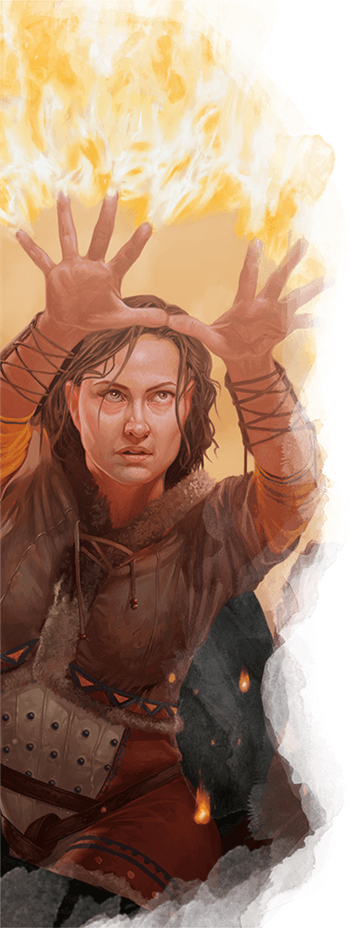 Choosing spells is a big deal for any caster, but you need to be particularly choosy. Sorcerers don’t learn many spells over the course of their career, so you’ll want to get pretty familiar with your spells. You’ll be using them for a long time. Unless, of course, you take full advantage of spell swapping—that is, trading an old spell out for a new one when you gain a level. First, you need to consider your cantrips. Choose a damage cantrip that synergizes with your Draconic Ancestry.
Choosing spells is a big deal for any caster, but you need to be particularly choosy. Sorcerers don’t learn many spells over the course of their career, so you’ll want to get pretty familiar with your spells. You’ll be using them for a long time. Unless, of course, you take full advantage of spell swapping—that is, trading an old spell out for a new one when you gain a level. First, you need to consider your cantrips. Choose a damage cantrip that synergizes with your Draconic Ancestry.
- For acid damage, choose: acid splash
- For cold damage, choose: ray of frost
- For fire damage, choose: fire bolt
- For lightning damage, choose: shocking grasp
- For poison damage, choose: poison spray
You get four whole cantrips at 1st level, so you still have a handful to choose from! These are all the sorcerer cantrips from the Player’s Handbook that you can choose from. I recommend having at least one long-range damage cantrip, one close-range damage cantrip, and two others of your choice.
With your cantrips chosen, you now get to select two 1st-level spells that you know. You’ll learn one new spell every level until 10th level, and then one new spell every other level after that until 17th—at which point you’ll stop learning spells entirely. Choose wisely! You’ll want one spell marked OFFENSE, and one spell marked either DEFENSE or SOCIAL, depending on how you want to play your character. All OFFENSE spells have their damage type labeled as well, to help you pick which is best for your Draconic Ancestry.
Note that this list only includes some spells from the Player's Handbook, so if you want to choose more unusual spells, or have other sources like Xanathar's Guide to Everything, you'll have to do a little self-directed research. This list is just here to get you started if this is your first time playing a Draconic Bloodline sorcerer.
- Burning hands (OFFENSE; fire)
- Charm person (SOCIAL)
- Color spray (DEFENSE)
- Disguise self (SOCIAL)
- Magic missile (OFFENSE; force)
- Witch bolt (OFFENSE; lightning)
- Shield (DEFENSE)
If you’re playing with Xanathar’s Guide to Everything in your campaign, chaos bolt is a must-have spell. Chromatic orb isn’t included on this list, despite its incredible versatility, because casting it requires that you possess a diamond worth 50 gp—a tall order for a 1st-level character that chooses starting equipment! Chaos bolt is generally better for a sorcerer, anyway.
Metamagic
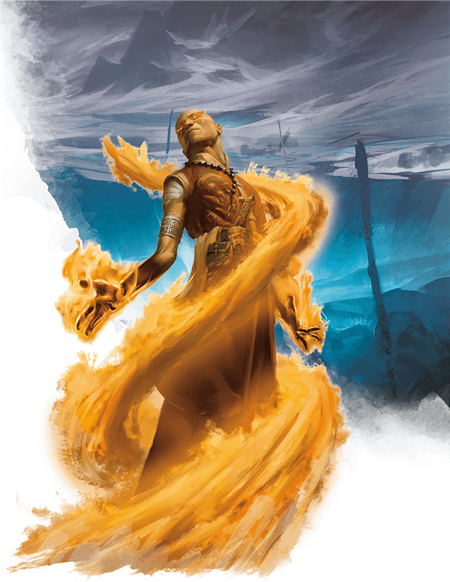 Metamagic is your hidden ace. Magic flows through your body, and you can twist its current in ways that other spellcasters can scarcely comprehend. When you reach 3rd level, you can choose two of eight different Metamagic options. The Sorcery Points you gained at 2nd level could, until now, only be used to refuel your spent spell slots. Now, you can use them to make your spells even more potent! I recommend choosing two of the following Metamagic options:
Metamagic is your hidden ace. Magic flows through your body, and you can twist its current in ways that other spellcasters can scarcely comprehend. When you reach 3rd level, you can choose two of eight different Metamagic options. The Sorcery Points you gained at 2nd level could, until now, only be used to refuel your spent spell slots. Now, you can use them to make your spells even more potent! I recommend choosing two of the following Metamagic options:
Heightened Spell. This option allows you to impose disadvantage on one of your spells’ saving throws. This is nice for burning hands, but it’s even nicer once you get access to spells like hold person and suggestion!
Quickened Spell. This Metamagic option is great for pure damage-dealing sorcerers, but note that if you cast a leveled spell as bonus action, the spell you cast as your action must be a cantrip. Beyond raw damage, though, Quickened Spell really shines by freeing up your action on a turn to Hide, Disengage, or perform some other type of action, rather than casting a spell. This is a big deal when you're surrounded by enemies and want to spend your turn doing more than just taking the Disengage action and running away.
Twinned Spell. Another good option for damage dealers, but it’s also very useful for buffing allies or debuffing enemies. Twin your haste spell to make two allies speedy! Or twin your hold person to lock down two foes for the price of one. Note that you can only twin spells that target a single creature. No twinning fireballs for instance, since they target an area instead of a creature.
Careful Spell. If you plan on laying down fireballs and don’t want to hurt your party, this Metamagic option will help you avoid collateral damage.
At Higher Levels
Once you reach 6th level, it becomes very important that your damage-dealing spells align with your Draconic Ancestry’s damage type. In the meantime, you’ll gain either Ability Score Improvements or Feats starting at 4th level and every four levels thereafter. Start by getting your Charisma score to 18 or 20, but then take a look at some of the feats available to you. Elemental Adept is great for busting through the damage resistances of creatures that are strong against your Draconic Ancestry’s damage type. Ritual Caster will get you a few ritual spells (since you can’t naturally cast spells as rituals as a sorcerer), like find familiar, phantom steed, or water breathing, depending on your campaign’s needs.
If you want more advice for building a sorcerer, check out Sorcerer 101. Have you ever played a Draconic Bloodline sorcerer? What advice would you give to players that want to play this subclass?
 James Haeck is the lead writer for D&D Beyond, the co-author of Waterdeep: Dragon Heist and the Critical Role Tal'Dorei Campaign Setting, the DM of Worlds Apart, and a freelance writer for Wizards of the Coast, the D&D Adventurers League, and Kobold Press. He lives in Seattle, Washington with his partner Hannah and their animal companions Mei and Marzipan. You can find him wasting time on Twitter at @jamesjhaeck.
James Haeck is the lead writer for D&D Beyond, the co-author of Waterdeep: Dragon Heist and the Critical Role Tal'Dorei Campaign Setting, the DM of Worlds Apart, and a freelance writer for Wizards of the Coast, the D&D Adventurers League, and Kobold Press. He lives in Seattle, Washington with his partner Hannah and their animal companions Mei and Marzipan. You can find him wasting time on Twitter at @jamesjhaeck.








-
View User Profile
-
Send Message
Posted Jul 28, 2019Yeah, he’ll be either blue or bronze.
-
View User Profile
-
Send Message
Posted Jul 28, 2019Cantrips cannot be replaced by any class per RAW. Sorcerers also know only 15 spells maximum except for the Divine Soul and Shadow Sorcerer, which both get an additional spell known.
-
View User Profile
-
Send Message
Posted Jul 28, 2019One interesting combination of note for draconic sorcerers - your Dragon's Breath spell (which, let's face it, every Draconic Bloodline sorcerer should know) only counts as casting a spell the first turn you use it. After that you can Quicken any other spell you like on the same turn you unleash your breath weapon, since using the spell after you've cast it isn't casting another spell, it's simply triggering the one you've already got going. A round or two of that and people will fear the dragon properly, especially since Dragon's Breath upcasts quite effectively.
-
View User Profile
-
Send Message
Posted Jul 28, 2019Love Sorcerer even with the terrible amount of spells known
-
View User Profile
-
Send Message
Posted Jul 28, 2019You can use the Magic Adept (Sorcerer) feat to gain an extra 1st level spell known and two extra cantrips.
And as mentioned in the article races that gain inherent spells are a good choice.
-
View User Profile
-
Send Message
Posted Jul 28, 2019Great article!
Does anybody know if chaos bolt is a sorcerer spell because it does a lot of damage and might be from the right type for your ancestor.
-
View User Profile
-
Send Message
Posted Jul 28, 2019Would it be possible to have your draconic ancestor be a shadow dragon or a dragon turtle. Dragon turtle is a little weird but it would be cool.
-
View User Profile
-
Send Message
Posted Jul 28, 2019Can someone explain why sorcerer warlock is so great? I don’t see it.
-
View User Profile
-
Send Message
Posted Jul 28, 2019A warlock gains eldritch blast, and at second level take agonizing blast to add charisma modifier to damage rolls. The you go eighteen levels into sorcerer, take quickened spell, and poof, you can now shoot of eight beams of eldritch blast a turn, dealing, if all hit, 8d10+40 force damage.
-
View User Profile
-
Send Message
Posted Jul 28, 2019There are a couple of ways you could do Shadow Dragon ancestry. Probably the best would be to go with the Shadow Sorcerer (Xanathar's Guide). You could select Dragonborn race. Or with the DM's permission you could make a standard draconic sorcerer with "Necrotic" as their element, but I think the selection of available necrotic spells would be a bit limited. You have Chill Touch as your cantrip though, so no worse off than acid/poison. Or, given that all shadow dragons start off with a colour, their descendant might be a standard draconic sorcerer.
I don't think dragon turtles make a habit of turning into humanoids and interbreeding, so it would be unlikely to have any humanoid descendants. You could make a draconic sorcerer whose race was tortle though... ;)
-
View User Profile
-
Send Message
Posted Jul 28, 2019In fairness, nothing about draconic bloodline requires one to have a dragon ancestor. An ancient dragon capable of bestowing a portion of its inherent magic unto one who has made a bargain is one of a few viable options. Using that example, then going a step further to making that ancient dragon an ancient dragon turtle would be fair enough an origin.
-
View User Profile
-
Send Message
Posted Jul 28, 2019That feat combined with ritual caster and elemental adept are my three highly recommended feats for any draconic sorcerer.
-
View User Profile
-
Send Message
Posted Jul 29, 2019Ohhh! Now I see! Thanks!
-
View User Profile
-
Send Message
Posted Jul 29, 2019Na, per RAW they certainly can: "Additionally, when you gain a level in this class, you can choose one of the sorcerer spells you know and replace it with another spell from the sorcerer spell list, which also must be of a level for which you have spell slots."
Cantrips are sorcerer spells. Therefore they can be replaced by a spell which is on the sorcerer spell list, and which are also of a level for which you have spell slots.
Note also the wording in the Divine Soul section of the description of the sorcerer class:
-
View User Profile
-
Send Message
Posted Jul 29, 2019Thing about Dragon Turtles though is by dragon standards they aren't particularly bright (Int 10) and don't cast spells. They are more hulking brutes than mystical beings that might hand out a portion of magical power.
In terms of game mechanics, there is little point. There is no "steam" element, the closest is fire. Which would mean a dragon turtle sorcerer would be identical to a red or gold draconic sorcerer.
-
View User Profile
-
Send Message
Posted Jul 29, 2019I honestly think this is not correct; if that were the case, you could basically replace a lvl 1 spell with an extra cantrip, which I'm pretty sure is not the case. Also note that the new spell must be of a level "for which you have spell slots", but you don't have spell slots for cantrips; you simply can cast them.
-
View User Profile
-
Send Message
Posted Jul 29, 2019Yes, but, speaking in game mechanics, there's no really difference between brass and gold and red, or white and silver, or blue and bronze, or black and copper. It's all just flavor. And a dragon turtle sorcerer would be pretty good flavor.
-
View User Profile
-
Send Message
Posted Jul 29, 2019You can't replace leveled spells with cantrips, you can replace cantrips with leveled spells. "[M]ust be of a level for which you have spell slots" applies to the spell gained by the trade, not the one sacrificed. The word "also" in that passages confuses some people, but it refers to the replacement spell being on the sorcerer spell list and also being of a level for which you have spell slots. It doesn't mean that the sacrificed spell also has to meet those two conditions; if it did, it would say so, and further the sorcerer description would not refer to "When your Spellcasting feature lets you learn or replace a sorcerer cantrip or a sorcerer spell of 1st level or higher," which would be impossible according to the latter interpretation.
Interestingly, looking closely at the RAW of this passage, there may be a potent loophole here, inasmuch as multiclass casters can have higher-level spell slots than the spells they normally learn upon gaining levels. However, in theory, you could exchange a sorcerer spell you know for one of the highest level for which you have spell slots. Eg, a sorcerer who took a big dip into Bladesinger for Extra Attack and gains 11th level, such that they are now a Bladesinger 6/Divine Soul 11, could chose to add a 6th level spell (but no higher) but could exchange a 1st-level spell for wish, which is a) on the sorcerer spell list, & b) of a level for which they have spell slots.
As a DM I wouldn't allow that -- it's pretty clearly unbalanced and not what the designers intended -- but it does illustrate the fact that there's a lot of power in the sorcerer class if you know where to look.
Absolutely; remember the dragon turtle from the last season of Airbender. Ancient mysterious creature imparts forgotten powers. Dig it.
-
View User Profile
-
Send Message
Posted Jul 30, 2019I wish I knew how to link, but here is the address you can go to see the lead designer say otherwise.
https://www.sageadvice.eu/2015/12/26/is-it-possible-to-replace-a-know-cantrip/
Cantrips do not count as spells known in that regard. Only spells that require slots can be switched out per RAW.
-
View User Profile
-
Send Message
Posted Jul 30, 2019A) That opinion was as to whether you can swap one cantrip for another, but, as we've established, you can't swap in a cantrip bc it doesn't use spell slots. That does not mean you cannot swap a cantrip (which is a spell) for a leveled spell, which RAW permits.
B) Going outside the text to the opinion of someone (even the designer) on what the rules mean is the definition of RAI. There's nothing wrong with RAI, but we were discussing "per RAW."